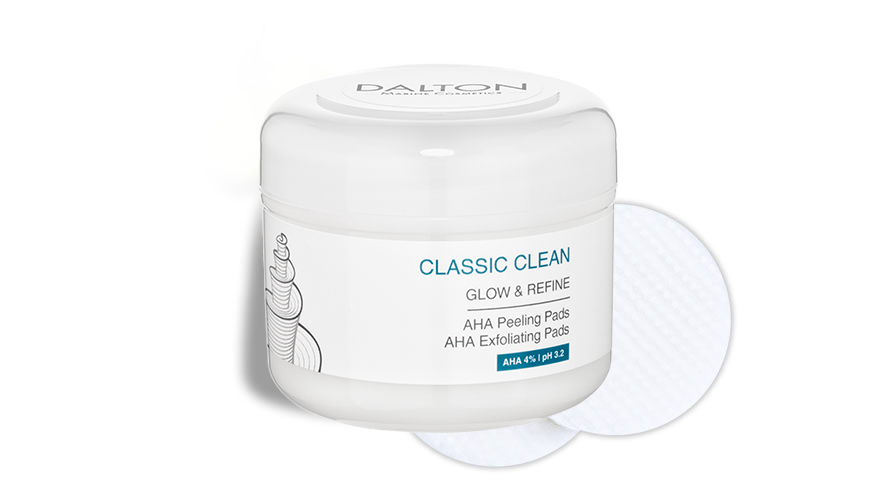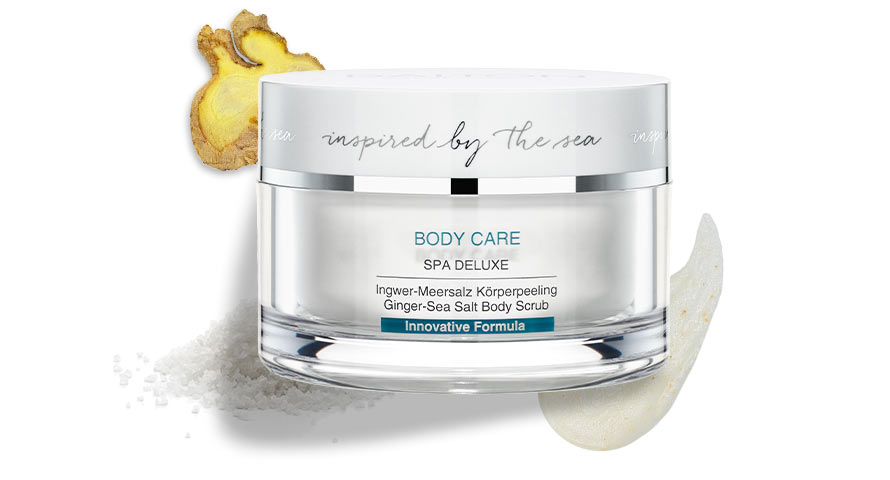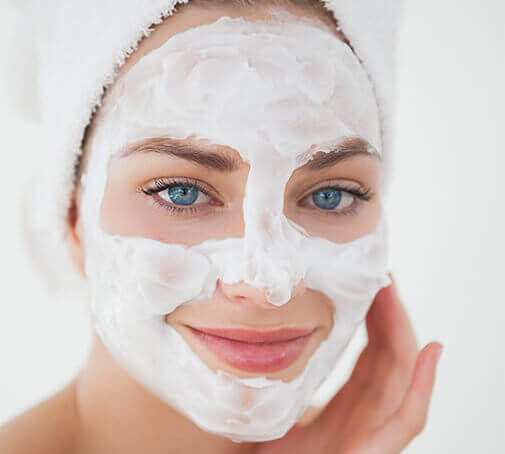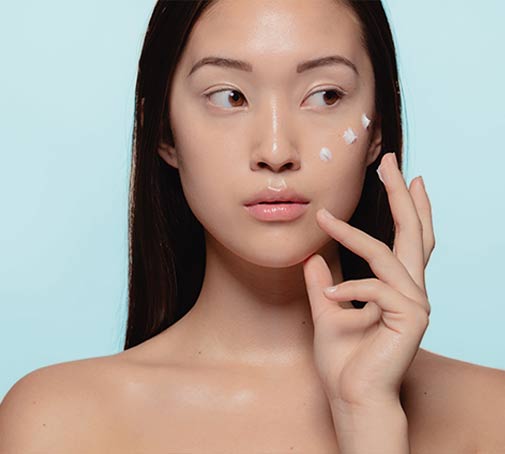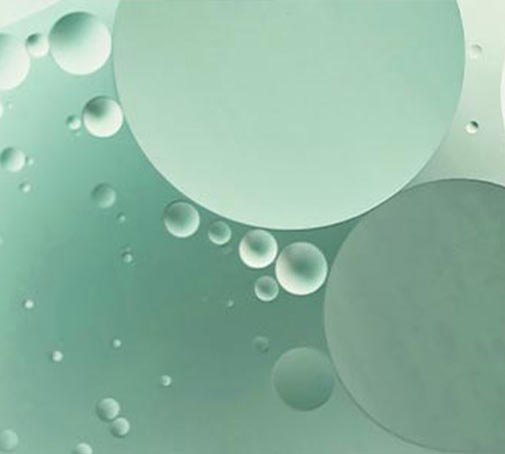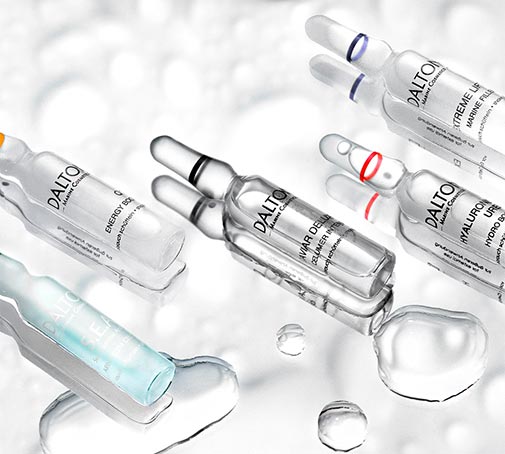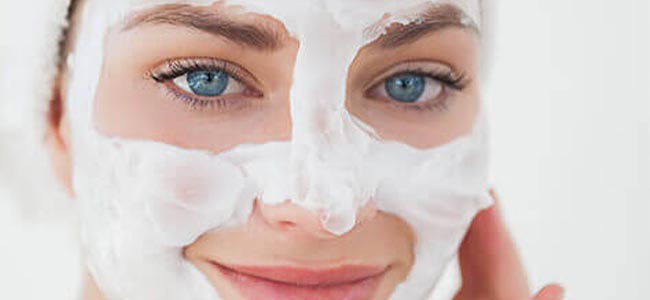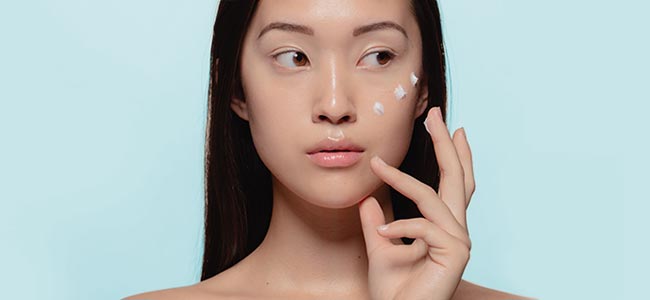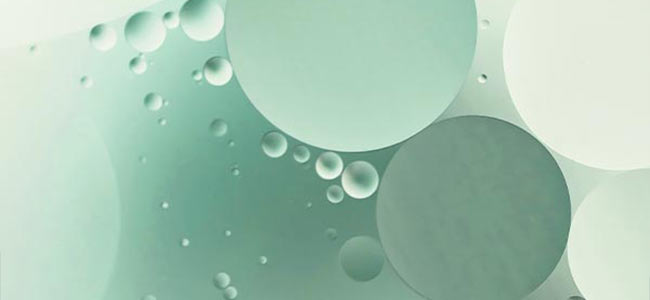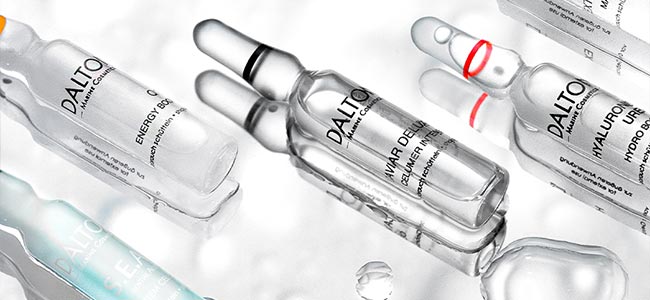
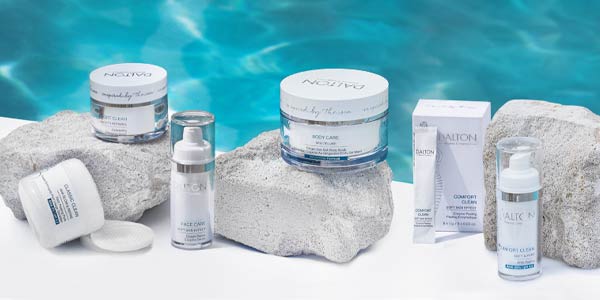
Exfoliation Guide
Can’t talk about skincare without talking about exfoliation! Face scrubs and peels are suitable for every skin type and offer some amazing beauty benefits that boost the effectiveness of your entire skincare routine. Read on to learn all about them!
Why Should You Exfoliate Your Face?
Exfoliation is the process of removing dead skin cells from the top layer of the skin, which stimulates cell turnover, accelerates the natural process of skin renewal and reveals healthy-looking, more radiant skin. It’s beneficial not just for acne-prone and dry skin. Exfoliating can also help to improve the appearance of wrinkles and dark spots. Even sensitive skin types should exfoliate regularly to get rid of any dry and dead skin build-up.


EXFOLIATION BENEFITS
- Gentle removal of dead skin cells
- Unclogs pores
- Smoother skin
- Even-toned complexion
- Pore-refining effect
- Helps reduce hyperpigmentation and scars
- Stimulates blood flow
- Enhances absorption of your skincare products
EXFOLIATION BENEFITS
- Gentle removal of dead skin cells
- Unclogs pores
- Smoother skin
- Even-toned complexion
- Pore-refining effect
- Helps reduce hyperpigmentation and scars
- Stimulates blood flow
- Enhances absorption of your skincare products
Different Types of Exfoliants
There are so many different ways to exfoliate, it can sometimes be difficult to find the right type of exfoliator for your skin. From DIY coffee scrubs to anti-aging facial peels, the choices seem endless. Let’s shed some light on the darkness, shall we?


1. Enzyme exfoliants
Other than traditional face scrubs, enzyme exfoliators do not contain any microbeads or grains to manually remove dead cells. They exfoliate the skin by using enzymes (mostly derived from papaya) to break down the proteins and lipids attached to dead skin, so it can be removed easily. These kinds of exfoliants are suitable for all skin types, even for sensitive skin and skin prone to couperose.


2. Physical exfoliants
Physical exfoliators contain tiny, rounded abrasives to exfoliate the skin. Gently massaging the scrub on your face or body in circular motions will also stimulate blood flow and leaves dry skin silky and soft.


3. Chemical exfoliants
You’ve probably heard of chemical exfoliation before. Facial peels with AHAs (alpha hydroxy acids such as glycolic and lactic acids) are among the most popular and most commonly used chemical exfoliators, along with BHA peels (beta hydroxy acids such as salicylic acid) and PHA exfoliators (polyhydroxy acids). Chemical peels have a much deeper effect than other kinds of peels and they can help with a wide variety of skin concerns such as hyperpigmentation, pimple marks, blackheads, acne-prone skin and wrinkles. You can use them both on the face and on other problem areas on the rest of your body.


1. Enzyme exfoliants
Other than traditional face scrubs, enzyme exfoliators do not contain any microbeads or grains to manually remove dead cells. They exfoliate the skin by using enzymes (mostly derived from papaya) to break down the proteins and lipids attached to dead skin, so it can be removed easily. These kinds of exfoliants are suitable for all skin types, even for sensitive skin and skin prone to couperose.


2. Physical exfoliants
Physical exfoliators contain tiny, rounded abrasives to exfoliate the skin. Gently massaging the scrub on your face or body in circular motions will also stimulate blood flow and leaves dry skin silky and soft.


3. Chemical exfoliants
You’ve probably heard of chemical exfoliation before. Facial peels with AHAs (alpha hydroxy acids such as glycolic and lactic acids) are among the most popular and most commonly used chemical exfoliators, along with BHA peels (beta hydroxy acids such as salicylic acid) and PHA exfoliators (polyhydroxy acids). Chemical peels have a much deeper effect than other kinds of peels and they can help with a wide variety of skin concerns such as hyperpigmentation, pimple marks, blackheads, acne-prone skin and wrinkles. You can use them both on the face and on other problem areas on the rest of your body.
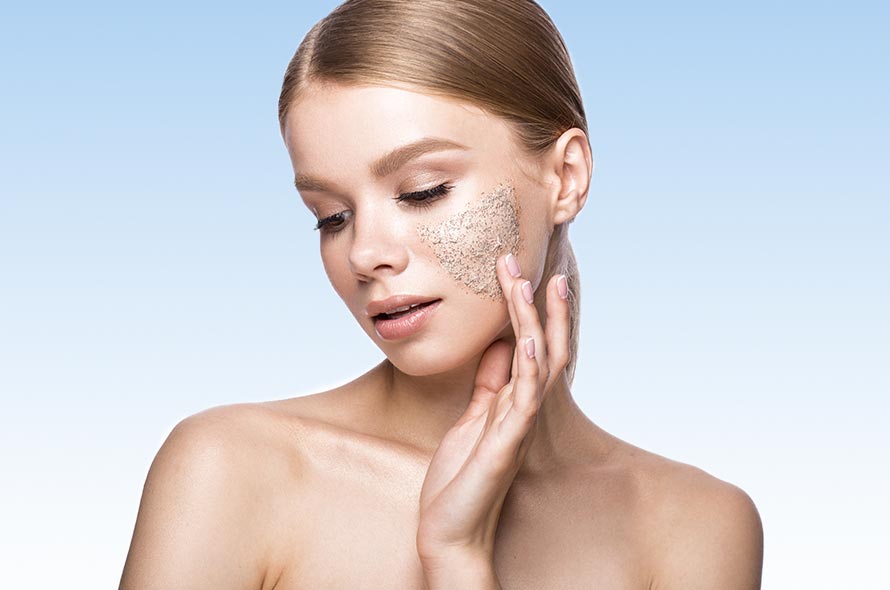

Frequently Asked Questions
How often should I exfoliate?
How often you should exfoliate at home depends on what face exfoliator you use. While you can use an enzyme peel once or twice a week without any problems, we recommend using the AHA peel about every 7 – 10 days. And don’t forget to wear sunscreen after a chemical peel, as your skin will be especially sensitive to the sun’s UV rays. That is why winter and spring are the best time for a chemical peel.
How to care for my skin after exfoliating?
Since your skin is especially receptive to active ingredients after exfoliating, we recommend using a face mask immediately afterwards to give you the best results.
What is the most powerful method of exfoliation?
For the most intense results, we recommend booking a treatment at your local beauty salon or aesthetician’s office. A consultation with your aesthetician can help you choose which treatment method is best for you. Microdermabrasion, Aqua Facial or a professional chemical peel are all great options for improving your skin.
How often should I exfoliate?
How often you should exfoliate at home depends on what face exfoliator you use. While you can use an enzyme peel once or twice a week without any problems, we recommend using the AHA peel about every 7 – 10 days. And don’t forget to wear sunscreen after a chemical peel, as your skin will be especially sensitive to the sun’s UV rays. That is why winter and spring are the best time for a chemical peel.
How to care for my skin after exfoliating?
Since your skin is especially receptive to active ingredients after exfoliating, we recommend using a face mask immediately afterwards to give you the best results.
What is the most powerful method of exfoliation?
For the most intense results, we recommend booking a treatment at your local beauty salon or aesthetician’s office. A consultation with your aesthetician can help you choose which treatment method is best for you. Microdermabrasion, Aqua Facial or a professional chemical peel are all great options for improving your skin.
DALTON Exfoliators
Not sure which product is best for your skin? Here is all the info you need to make that choice.
Face Scrubs & Peels
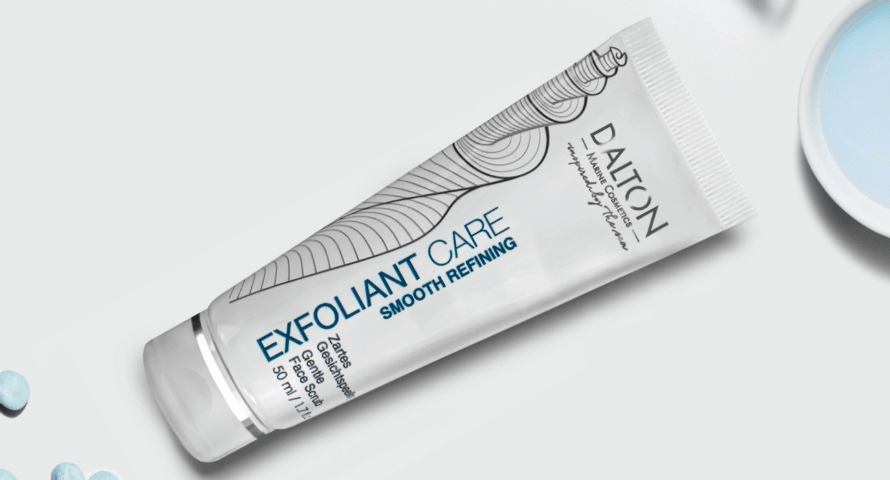

COMFORT CLEAN Exfoliating Scrub
Gentle cream exfoliator
✓ Fine, rounded silica beads
✓ Nourishing, creamy texture
✓ Stimulates blood flow
Who is this for? Alll skin types, especially dry skin.
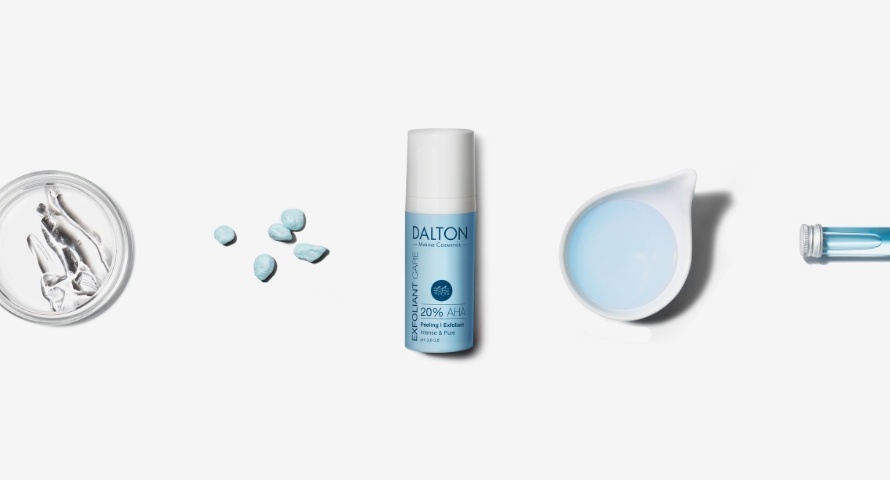

20% AHA EXFOLIANT
Lightweight serum with glycolic acid and lactic acid
✓ Improves skin texture
✓ Reduces dark spots, pimple marks and fine wrinkles
✓ Stimulates collagen and hyaluronic acid production
Who is this for? Mature, dry skin
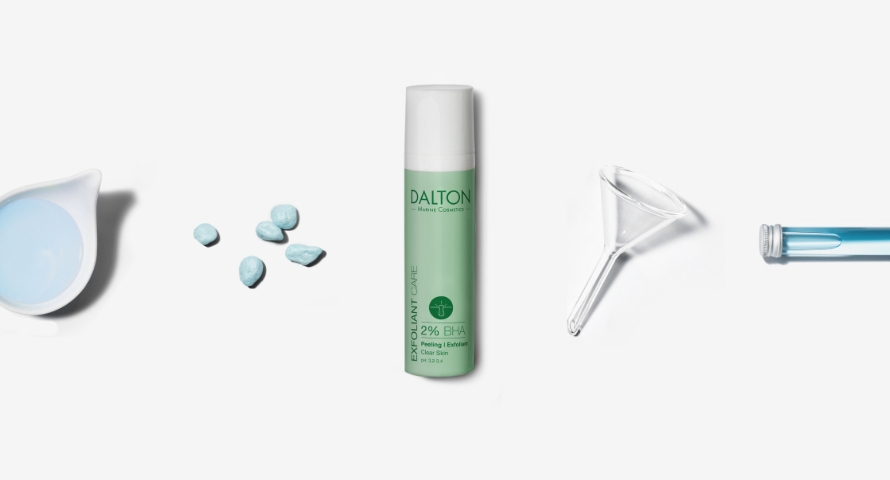

2% BHA EXFOLIANT
Anti-inflammatory exfoliant with salicylic acid
✓ Clears clogged pores
✓ Prevents blemishes
✓ Helps treat keratinization disorders
Who is this for? Oily, blemish-prone and acne-prone skin


